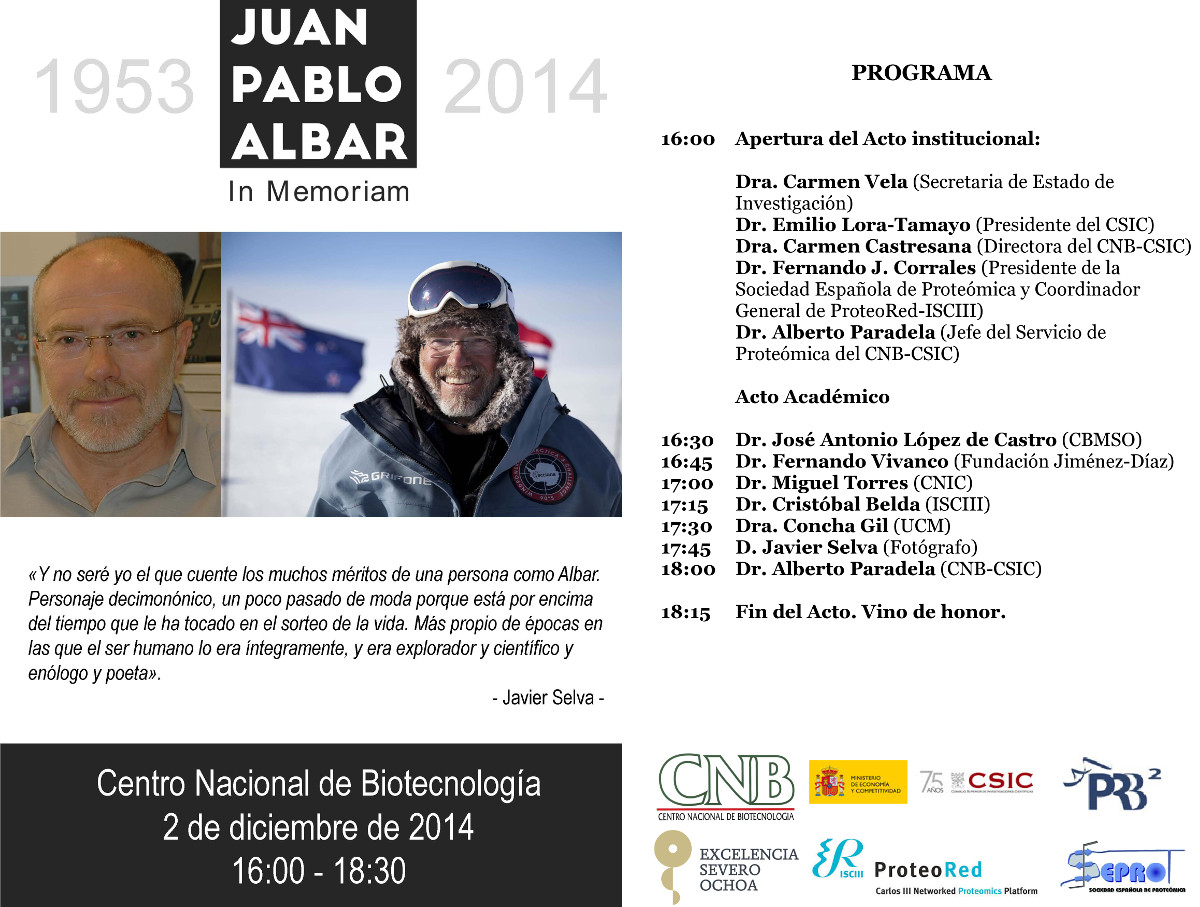En honor de Juan Pablo Albar, el martes 2 de diciembre de 2014 se celebró en el CNB el siguiente acto:

Juan Pablo Albar (1953-2014), amante de grandes retos, explorador incansable, partió a su última expedición, esa que uno emprende en solitario. El escalador de cimas; el corredor de fondo; el aventurero del proteoma humano y, sin duda, el bioquímico más conocido de la Antártida, nos dejó la madrugada del pasado 19 de julio. Entre proteínas e increíbles aventuras, solo al alcance de unos pocos, se marchó sin avisar a nadie, como el susurro del viento de las nevadas cumbres que tanto amaba. En él, ciencia, deporte y aventura se fundían en su más íntima esencia, en la nobleza, superación de nuevos retos, conseguir nuevos conocimientos y, en definitiva, en hacer un poquito más grande al ser humano. Los límites entre sus tres aficiones eran tenues, su naturaleza de científico y explorador le condujo a recorrer la Antártida en el Proyecto Trineo, desde su entrada por Sudáfrica hasta su salida por bahías repletas de pingüinos. “Me alegro de haber ido”, dijo y convocó “cálidamente”, desde el mismísimo Polo Sur, a la comunidad científica para trabajar con él en uno de los más grandes retos de la Biología, el Proyecto Proteoma Humano.
 Juan Pablo Albar se licenció en Ciencias Químicas en la Universidad Complutense de Madrid, donde unos años más tarde, en 1981, obtuvo el título de Doctor. Tras unos años de trabajo en el sector privado, comenzó su trayectoria académica en el Centro Nacional de Biotecnología del Consejo Superior de Investigaciones Científicas (CNB-CSIC), donde se convirtió en uno de los pioneros y principales impulsores de la proteómica en España, punto de referencia necesario en grandes iniciativas, nacionales e internacionales, destinadas a entender la biología humana y las causas de la enfermedad. Fue Investigador Científico del CSIC, Director de la Unidad de Proteómica del CNB, coordinador de la Plataforma de Proteómica en Red del Instituto de Salud Carlos III (ProteoRed-ISCIII), coordinador de la Plataforma de Recursos Biomoleculares y Bioinformáticos, PRB2-ISCIII, miembro de las Juntas Directivas de la Sociedad Española de Proteómica (SEProt), de la Asociación de Proteómica Europea (EuPA), de la Organización del Proteoma Humano (HUPO), miembro del Comité Ejecutivo del Proyecto Proteoma Humano (HPP), Director del Proyecto Proteoma Humano Español centrado en investigar el proteoma asociado al cromosoma 16. Su trabajo ha dado lugar a más de 160 publicaciones científicas y ha servido de inspiración a numerosos investigadores en el ámbito de la proteómica y de la bioquímica en general.
Juan Pablo Albar se licenció en Ciencias Químicas en la Universidad Complutense de Madrid, donde unos años más tarde, en 1981, obtuvo el título de Doctor. Tras unos años de trabajo en el sector privado, comenzó su trayectoria académica en el Centro Nacional de Biotecnología del Consejo Superior de Investigaciones Científicas (CNB-CSIC), donde se convirtió en uno de los pioneros y principales impulsores de la proteómica en España, punto de referencia necesario en grandes iniciativas, nacionales e internacionales, destinadas a entender la biología humana y las causas de la enfermedad. Fue Investigador Científico del CSIC, Director de la Unidad de Proteómica del CNB, coordinador de la Plataforma de Proteómica en Red del Instituto de Salud Carlos III (ProteoRed-ISCIII), coordinador de la Plataforma de Recursos Biomoleculares y Bioinformáticos, PRB2-ISCIII, miembro de las Juntas Directivas de la Sociedad Española de Proteómica (SEProt), de la Asociación de Proteómica Europea (EuPA), de la Organización del Proteoma Humano (HUPO), miembro del Comité Ejecutivo del Proyecto Proteoma Humano (HPP), Director del Proyecto Proteoma Humano Español centrado en investigar el proteoma asociado al cromosoma 16. Su trabajo ha dado lugar a más de 160 publicaciones científicas y ha servido de inspiración a numerosos investigadores en el ámbito de la proteómica y de la bioquímica en general.
Gran científico, deportista y, sobre todo amigo, Juan Pablo nos dejó un legado de optimismo y saber hacer que nos guiará en el desarrollo futuro de los proyectos que él inició y que han permitido convertir a nuestro país en una referencia indiscutible dentro de una disciplina emergente, como lo es la Proteómica y sus aplicaciones en el ámbito de la salud.





